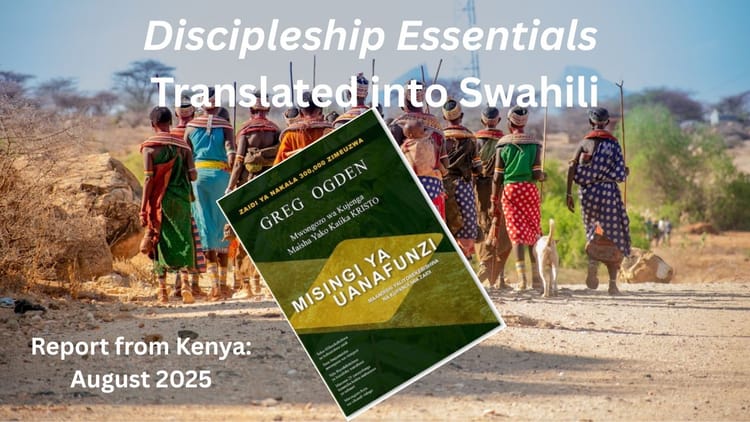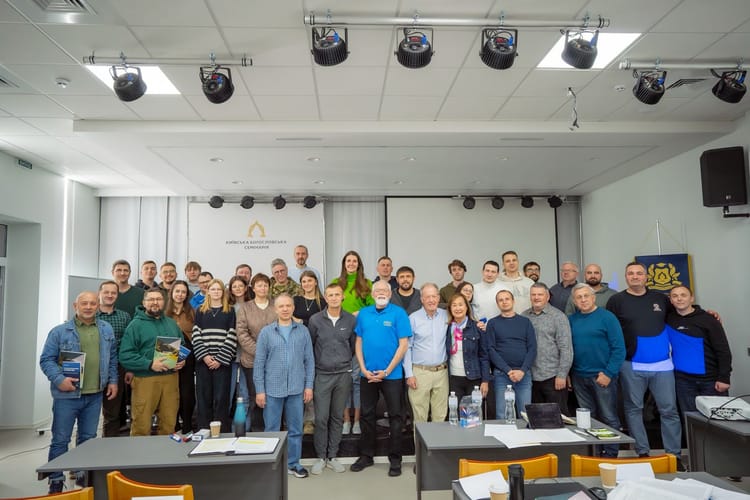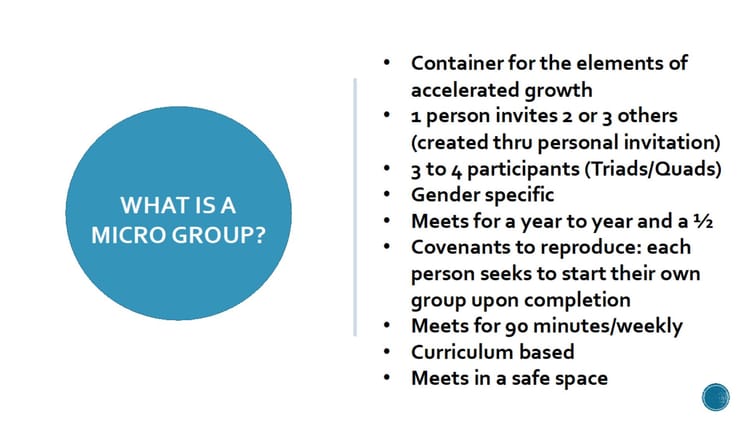Sinkholes and Potholes: Dangers and Barriers to Effective Disciplemaking

Sinkholes are large holes that can swallow houses and cars and people. Potholes are smaller holes in roads that are annoying drivers.
Similar dangers can threaten your disciplemaking initiatives. First, Ralph Rittenhouse says, "Be alert to recognize and avoid sinkholes that could destroy the pathways to effective disciplemaking."
Beware!
Be aware of 8 sinkholes that are signs of being swallowed up and destroyed.
1-Theological error
A pastor friend of mine leads a large multi-level disciplemaking movement with thousands of believers. While visiting us in southern California, he received a report that one in the organization had begun teaching a doctrine that denied the deity of Christ. He immediately confronted this issue.
Theological error or heresy is what much of the New Testament was written to correct. We should not be surprised, but ready to make needed corrections. As group members search for truth and understanding of Scripture,we expect that numerous ideas and opinions will emerge.
Because Discipleship Essentials is biblically based, most errant thinking will be corrected by the group. The Holy Spirit has a way of preserving truth for those who honestly seek it. Some debatable issues will arise that are best left unsolved. That's ok. Avoid making nonessentials something to discuss in your MicroGroup. But, a quote attributed to early church fathers said,
"IN ESSENTIALS UNITY,
N NONESSENTIALS LIBERTY,
IN ALL THINGS CHARITY.”
In another MicroGroup, a church elder revealed that he was unsure about the inspiration of Scripture. Though very involved in the church since childhood, this church elder never had a “safe place” to express his doubts and to get helpful feedback.
Researching an additional study aid like God Wrote a Book by James MacDonald, he was able to reassure his flagging faith. When a highly intelligent person often questioned accepted biblical beliefs, another MicroGroup member gave him a copy of Norm Geisler’s book, I Don’t Have Enough Faith to Be an Atheist. He never knew there was so much evidence for what we believe true.
2-Process Degeneration
A second challenge that church initiatives face is process degeneration. That is when people, not understanding the crucial value of certain system components, decide to take short cuts. We had a group that decided to forgo the memorization of Scripture. They did not realize how crucial Scripture memory is to effective disciplemaking. Many of the designated Scripture passages require daily rehearsal to be accurately quoted at the next weekly session. Keeping God’s Word fresh in our minds and hearts throughout the week allows the Holy Spirit to bring clarity and real-life application in us.
Disciplemaking is time consuming. That is why some pastors hesitate to venture into the process. They do not recognize the value of going slow and investing in a few.
One pastor decided to use Discipleship Essentials as the basis for a sermon series, hoping his congregation would be able to develop and grow simultaneously. Discipleship Essentials makes a great sermon series, but thinking that preaching it will make mature disciples is naïve.
Preaching is often just information transfer. As Dr. Greg often reminds us, the greatest preacher in the world did not depend on preaching to make disciples. Focusing on a few assures time for personal development, making sure that even the slowest member of the group does not get left behind. It allows you to pace the learning process at the speed of the learners, giving the Holy Spirit opportunity to bring about authentic growth.
Even expanding groups to five or six will minimize adequate verbal interchange. That is why we recommend four to a group. We have found that an essential part of learning is vocalizing the truths that are being absorbed by the heart. When you hear yourself stating truths, they are remembered longer and lodge deeper. Not being on a schedule for completion permits stopping, when needed, to deal with personal issues.
A member of one of my groups sat down as our weekly gathering started. He looked exhausted. One man commented, “Hey, what’s up with you?”
His response, “I think Pammy and I are done.” He went on to explain that he was shopping for an apartment and preparing to move out of his house. Strife at home had become unbearable. We put down our books that day and spent the whole session counseling and encouraging our brother regarding his marriage.
In fact, we spent the better part of the sessions for several weeks helping him work through issues. On the last Sunday of my ministry at Camarillo Community Church, Ed and Pam were on the front row. When the moderator of this special service asked for people to share how the ministry of Ralph and Jackie Rittenhouse had effected them, Ed was the first one to his feet. “My wife and I would not be here today if it were not for the discipleship quad that I was in with Pastor Ralph.” Because there were only four of us in the group and we had no rush to keep on a schedule, we took the time to help Ed save his marriage. Forming people in Christ is a slow work, but it is too important to be hurried, and too critical to be delayed. It is too essential to rush--too crucial to put off.
3-Mixing Genders
Another classic mistake is trying to mix genders. Obviously, men want their wives to grow and women want their husbands to grow. When they find something they think will help them, they want their spouse to enjoy it too. But, gender specificity is critical to discussing issues that need to be dealt with. One man told me that he and his wife discuss everything together.
I told him that was great, but he was not going to be discussing everything with my wife present. Men need to talk about men’s issues and women need to discuss women’s issues, and they need the freedom to talk about these things unhindered by mixed company.
The presence of mixed company will impede open and honest discussion. I find frequently when men feel safe, their struggle with things like pornography surface. Men need to talk about these things if authentic change is going to occur.
Open groups are also a problem. Once the group has begun and people begin to free safe, adding outsiders deters openness and honesty.
4-Hijackers
We had someone volunteer to be a leader and then took the group off in a totally different direction. She wanted to use one of Oprah’s book as the text.
Being careful with leader selection is critical in the beginning. If a person has never been in a group, there is a danger in misunderstanding the leader role. Some see it as an opportunity to exercise their teaching gift, and suddenly they are no longer just a facilitator.
One of the great benefits of the disciplemaking quad is the advantage of four "teachers." Each member listens the Holy Spirit as they prepare for the weekly meeting, and then share the insights that they individually learned. In Colossians 3:16 the Apostle Paul said,
“Let the message about Christ, in all its richness, fill your lives. Teach and counsel each other with all the wisdom he gives.”
We consider the Holy Spirit the real teacher in each group. The group members learn from Him through their own study of the Word, and through the voices and lives of the others in the group.
5-Intentional Reproduction Failure
From the very beginning, intentional reproduction needs to be in focus. Discipleship is about you becoming a disciple, a follower. It’s about your growth into the likeness of Christ, becoming more loving, generous, faithful, and gaining additional Bible knowledge. Disciplemaking, however, is about others. It is about helping others grow into the likeness of Christ.
Jesus was not just about making disciples, he was about making disciplemakers. With only three years to leave his impact on them, Jesus spent the majority of his time with the twelve. Near the end of his ministry on earth, Jesus said to his disciples, “As the Father has sent me, so I am sending you” (Jn 20:21).
Our groups are about becoming disciplemakers. Yes, "like begets like." Knowing multiplication is the ultimate objective needs to be clear from the start. We always encourage taking turns leading the group.
After five or six weeks of modeling by the group convener, others in the group are generally ready to facilitate. There is a Leaders’ Guide at the end of Discipleship Essentials. Become familiar with it, and as the group nears the end of the curriculum, digest what that means to rotate being a facilitator. Some still might be hesitant. I call this POSTPONED OBEDIENCE.
In other words, you give up the right to say “no” to Jesus when you begin following him. If you do not do what He says, do not trick yourself into thinking you are following Him.
“I have loved you even as the Father has loved me. Remain in my love. When you obey my commandments, you remain in my love, just as I obey my Father’s commandments and remain in his love” (John 15:9-10).
“Therefore, go and make disciples of all the nations, baptizing them in the name of the Father and the Son and the Holy Spirit. Teach these new disciples to obey all the commands I have given you. And be sure of this: I am with you always, even to the end of the age” (Matthew 28:19-20).
“Those who accept my commandments and obey them are the ones who love me. And because they love me, my Father will love them. And I will love them and reveal myself to each of them” (John 14:21).
Proficiency of the MicroGroup
- An incubator for initial development
- A hospital for care and recovery
- A hothouse for personal growth
- A gymnasium to develop strength and power
- A deployment center to launch into service
To go and make disciples is commanded service. Obedience is not an option for an authentic Christ-follower.
6-Ministry Distractions
A very thoughtful and experienced pastor asked me at a training session, “What did you have to give up to make room on your activities calendar?”
I had to think for a moment, and then I responded dramatically, “We had to cancel Christmas!” That sounds far out, but let me explain. Initially, we were an attraction-oriented church and Christmas offered a great opportunity to produce something that would attract lots of people. We had a wonderful gal, Cheryl, on our staff, with years of extraordinary production experience. We had become widely known for our Christmas spectaculars. This event was the biggest event on our calendar, and it was an “all skake” where everyone was expected to participate. There were singers and dancers, band members, and actors in the production. We also needed promotion, ticket sales, parking attendants, ushers, and stage crew. This took July-December planning, promoting, executing away from what Jesus meant the church to be.
The participants needed meals and childcare, and we were all challenged to pray fervently for our non-churched friends and neighbors, and to make sure they came to the event. Planning began in the summer. Rehearsals for the music and drama gobbled up everyone’s spare time in October and November. Six to eight performances in early December brought in thousands of attendees and hundreds of “response-card decisions.”
We were a couple of years into our new disciplemaking initiative started in 2010, when I sat down with our imminently talented Christmas production director. I had exciting new ideas of how to make this next Christmas the best ever. After an animated presentation of my ideas, I waited for her enthusiastic response, but...she was strangely quiet.
Then she told me she would like to pray about it, and get back to me. I admit, I was somewhat deflated. Later that week I got a call. She wanted to meet for lunch to talk about Christmas. When I arrived at the small Mexican restaurant, I saw she had brought her husband Joe with her (I later realized it was for moral support).
“I don’t think I can do the Christmas program this year,” she began. “And, I don’t think you should either.” (SHOCK) Last year most of us had to cancel our disciplemaking efforts during October and November, and December is a hard month anyway. I’m having a wonderful time with the ladies in my disciplemaking quad and they are really starting to grow. If I cancel for three months, it could be devastating. If we are truly serious about making disciples, as you say we are, we have to do things differently.”
Now I was really disappointed. My own staff member was preaching my message back to me. But, she was right. When we analyzed our results, we found that most of those who filled our thousand-seat auditorium were from other churches.
We were just providing Christian entertainment.
And, most of those who recorded decisions, we never saw again.
Yes, there were some valuable results of our enormous outreach efforts, but we later found that we could realize most of them without sacrificing three months of disciplemaking. We canceled our giant Christmas event that year, and then made adjustments that allowed us to keep Christ’s priority our priority.
We also began to evaluate all our activities and programs against the priority of intentional disciplemaking. We even began to adjust our budget expenditures by that same grid.
7-Satan
There are Christ followers today who are facing wicked and violent resistance and persecution. There are evil rulers and authorities with mighty power in this dark world. But, Satan is also subtle and cunning, even able to influence one the chosen twelve.
“For we are not fighting against flesh-and-blood enemies, but against evil rulers and authorities of the unseen world, against mighty powers in this dark world, and
against evil spirits in the heavenly places” (Ephesians 6:12).
We dare not forget that this is a spiritual battle we are in. We would be foolish not to expect interference from his side. When Paul finishes describing the various parts of the armor of God, he exhorts us to
“Pray in the Spirit at all times and on every occasion.” (Ephesians 6:18)
If we are serious about making disciples, we need to be serious about prayer. There is an enemy for which prayer is our primary defense.
8-Loss of focus
The challenge of building a disciplemaking church culture requires endurance.
To see disciplemaking become a part of the identity of the church demands “a long obedience in the
same direction.”
In our everything-needs-to-happen-tomorrow society, installing a new ministry paradigm is nearly impossible. New values and practices need to be rerouted in the life of the church. This may prove to be a long, spiritual battle.
For the lead/senior pastor particularly, this has to be a major focus. There is so much on the plate of this leader already, when the “fires” come, it will seem like all the mental and spiritual energy will be consumed just trying to survive. When the plate is full, all of it seems of equal importance. It is very easy to lose your way. As was previously mentioned and worth the repetition, having a coach who knows how to help you keep the main thing, the main thing will be invaluable.
How would you or did you address them?
Next week: Potholes will be defined and identified.





Member discussion